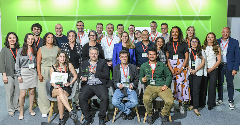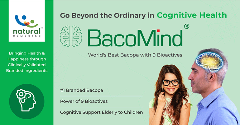News
Scouting out the latest health trends and innovations at Vitafoods Europe
20 May 2022From mood, cognition, and gut health to the importance of selling experiences rather than products, the Healthy Marketing Team (HMT) rounds up the biggest trends it spotted at Vitafoods Europe last week.
Last week, the HMT, which has been working with the B2B2C industry for more than 15 years, was at Vitafoods Europe, the world’s premier nutraceutical event, in Geneva. This annual gathering sees a truly global audience covering the entire nutraceutical supply chain.

The body and mind working together
“A burning industry question that was circulating was this: in the last two years of the pandemic, the nutraceutical industry has been growing thanks to the consumer demand for ingredients which support immunity. But with the pandemic ending: what’s next?” asks Maria Pavlidou, partner marketing communications and senior strategy consultant at the HMT, who addressed this topic in a session about putting COVID-19 in the rearview mirror, available to watch online.
“At the HMT, we see that immunity is evolving with consumers shifting away from the single immunity benefit to a more holistic view on health considering good mental balance as an important building block for a body’s adequate response to any health threat,” says Pavlidou. “The connection between physical and mental lies in the gut and it is reflected by the rise of attention to your microbiome and the gut – brain connection. When walking the show floor, we saw this being a recurring topic with many innovations in this area.”
Solutions for mood, cognition & the microbiome
According to Pavlidou, the trends seen at Vitafoods Europe very much reflected the HMT’s findings about mental well- being, with mental and cognitive health and especially sleep as key topics in many booths. In one discussion with a big industry player, HMT found out how it is exploring the biotransformation processes occurring within our bodies and identifying molecules that are linked with cognitive health, such as SAMe (S-adenosyl-methionine) and folate, and developing nutritional solutions to support mood and cognitive health. A “fascinating” scientific development, says Pavlidou.
Regarding the shift from physical to mental with the gut as the protagonist in this change, the HMT met with a start-up that is on a mission to make the microbiome more accessible to everyday consumers with products in a format that consumers will actually want to take. For instance, Pavlidou tasted a microbiome powder that can be added any food or drink– in her case, cold ginger tea.
Sell sensorial experiences, not products
According to the HMT, the industry recognizes that good sensorial experiences are key for consumer acceptance.
“There are many opportunities to be had by providing not only relevant health benefits, backed by strong science, but also great brand experiences,” Pavlidou tells Ingredients Network. “One manufacturer brought to the show a product in a convenient granule format, specially designed to deliver vitamins and minerals. The granules are colourful and fun but don’t have a flavour, so I could sprinkle them in my yoghurt and really enjoyed it.”
At another booth, the HMT tasted an iron syrup with a pleasant flavour.
“This is a real technical challenge as anyone who as ever worked with iron can tell you,” adds Pavlidou. “And talking about experiences, what would you say if your supplements could come in your Nespresso capsule? We tried a Nespresso coffee with coenzyme Q10, which needs to be taken at breakfast. A daily ritual for a higher therapy adherence and a very positive consumer experience.”
How to stay relevant: Be an innovation partner, not just a supplier
The HMT has identified four steps in the journey to becoming an innovation partner. Companies look beyond simply selling ingredients to selling concepts. They should then expand this to brands and categories.
The brand- building company says it was happy to witness B2B organisations evolving from a single focus on ingredient-selling to supporting customers with ready-to-launch concepts.
“Walking the floor at the show last week, we saw many amazing examples of such concepts. Many B2B companies realise the importance of selling more than ‘just the ingredient’. We think that in order to stay relevant and to create a competitive advantage, there are still two further steps to take, beyond concept-selling. Step three: engage with cross-functional teams to co-create brands and innovate whole categories. Step four: step up into being a true innovation partner,” Pavlidou says.
Related news

Walmart Marketplace’s record growth prompts search for UK sellers
26 Sep 2025
Walmart’s third-party e-commerce platform, Marketplace, has witnessed extraordinary growth – but a need for more product diversity has prompted the retailer to recruit UK sellers.
Read more
The winners of Vitafoods Europe Startup Challenge 2025 revealed
29 May 2025
Four startups – Yomio Drops, PFx Biotech, Revobiom, and Favamole – took top prizes at this year’s Vitafoods Europe Startup Challenge awards.
Read more
East takes on West in the fight for future food flavours
30 Apr 2025
Asian and South American flavours are now key components on global menus, driven by a growing global appetite for culinary mashups.
Read more
Food companies urged to bring ‘joy’ and urgency to healthy food mission
14 Mar 2025
For too long, businesses have treated health and sustainability as separate agendas – but there is growing evidence to show diets that benefit human health can also enhance that of the planet, say experts.
Read more
Entries open for inaugural Vitafoods Europe Innovation Awards
29 Jan 2025
Entries are open for the inaugural Vitafoods Europe Innovation Awards, celebrating the ingredients, finished products, partnerships, and initiatives redefining the nutraceutical landscape.
Read more
Paris Olympics: Food and beverage brands champion health, fun, and sustainability
5 Aug 2024
Food and beverage brands are aligning with the Paris Olympics 2024 Food Vision, which emphasises sustainability, local sourcing, and plant-based diets.
Read more
Natural Remedies: Bringing health and happiness via validated branded ingredients
18 Apr 2024
Natural Remedies is an internationally renowned botanical healthcare company committed to advancing the field through rigorous research and the development of clinically validated Branded Ingredients. Guided by our foundational principle of ‘BEING USEF...
Read more
Exploring the future of health and wellness retail at Vitafoods Europe
14 Mar 2024
With retail-focussed content sessions, buyer networking, and finished product tasting sessions, this year’s Vitafoods Europe offers a not-to-be-missed opportunity for retailers to up their health and wellness game.
Read more
Sustainability meets innovation at Fi Europe 2023's Sustainability Ingredients Zone
9 Jan 2024
Fi Europe’s Sustainable Ingredients Zone showcases ingredients forging a path toward a greener future. Three innovators are redefining what sustainability within the food and beverage industry means, with upcycled products, regenerative agriculture, an...
Read more
Unleashing the power of plants at Fi Europe’s New Product Zone
5 Jan 2024
In the diverse landscape of plant-based innovation, Fi Europe 2023's New Product Zone spotlighted ten plant-based ingredients, tailored to meet the rising demand for sustainable and delicious options.
Read more